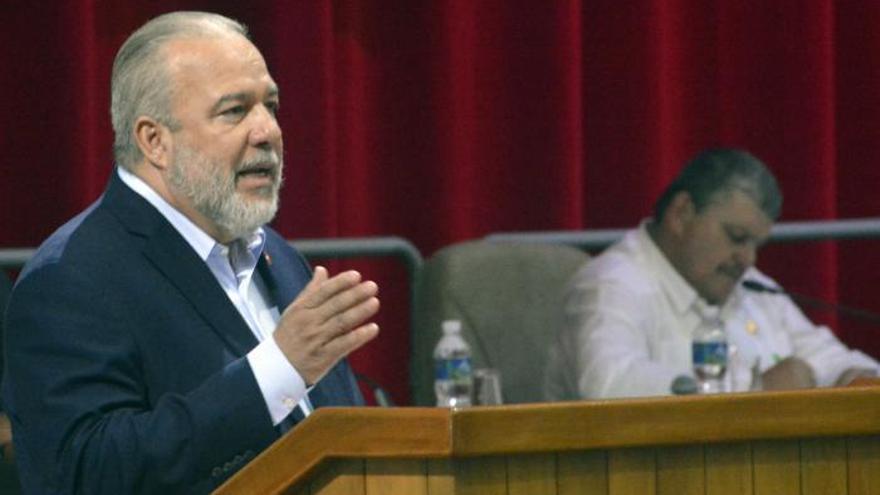
![]() 14ymedio/EFE, Havana, 20 December 2023 — The unsustainable economic situation of the Island has led the Government to establish a shock plan starting at the beginning of 2024. Among the main measures announced by Prime Minister Manuel Marrero on the first day of the second ordinary session of the National Assembly, are the increases in prices of products and services and the end of the universal subsidy for the basic food basket sold through the rationing system.
14ymedio/EFE, Havana, 20 December 2023 — The unsustainable economic situation of the Island has led the Government to establish a shock plan starting at the beginning of 2024. Among the main measures announced by Prime Minister Manuel Marrero on the first day of the second ordinary session of the National Assembly, are the increases in prices of products and services and the end of the universal subsidy for the basic food basket sold through the rationing system.
Regarding the rationed market, Marrero argued that the objective is to move to “subsidizing people and not products” to achieve “a more fair and efficient scheme,” tacitly recognizing the increase in social and economic inequalities.
“It is not fair that those who have a lot receive the same as those who have very little. Today we subsidize the same to an elderly pensioner as to the owner of large private businesses who has a lot of money,” he argued.
Thus, he continued, the Ministry of Labor and Social Security must identify people by their degree of “vulnerability,” so as to “not leave anyone helpless.” The latter group will be able to continue acquiring highly subsidized basic products with the ration card.
Marrero stressed that this classification will be carried out in “the coming weeks and months,” without further details.
Prominent among these increases are the 25% increase in the electricity rate for the 6% of the residential sector that consumes the most, and the move to require tourists to pay for fuel in foreign currency
The head of the Cuban Government also assured that, given the situation, the State cannot continue with the “waste” in certain subsidies, such as water, electricity, liquefied gas, transportation and fuel.
Prominent among these increases are the 25% increase in the electricity rate for the 6% of the residential sector that consumes the most, and the move to require tourists to pay for fuel in foreign currency. The cost of water supply will triple for those who do not have timed service and the price of a liquefied gas cylinder will increase by 25%.
Marrero also announced that “new rates will be applied” to passenger transportation services, but without detailing what those rates will be.
Another still unspecified forecast announced by the prime minister is the end of the exemption from customs taxes for the import of food and medicine, which, for the moment, he clarified, will be extended.
Marrero also announced that next year the Government will change the official exchange rate of the peso with respect to the dollar, for which a working group has been created with the Central Bank of Cuba.
Since 2021, the official exchange rate remains at 24 pesos per dollar for legal entities and 120 CUP for individuals. In the informal market, meanwhile, the dollar has skyrocketed to 273 pesos.
The prime minister also left the door open to a “review” of the number of people currently on the state payroll
Another product that will see its cost increase is tobacco, which, according to the prime minister, “in many cases is bought for resale.”
The prime minister also left the door open to a “review” of the number of people currently on the state payroll, in reference to possible cuts to reduce the wage bill.
In this regard, he pointed out that the authorities must “review the state structures and templates” to guarantee “efficient management” and announced that “there is a group that is studying a law on the organization of the central administration of the State.”
This Monday, the Minister of Economy and First Vice Minister, Alejandro Gil, had already warned of the debacle of the situation, specifying that Cuba’s gross domestic product (GDP) will contract between 1% and 2% in 2023, versus the forecasted growth of 3% previously expected for the end of the year.
Inflation, for its part, is close to 30%, and its first victim is the “purchasing capacity” of Cubans’ salaries. Finally, the deficit will rise to around 15% of GDP, after the Executive recognized a deviation of 44% with respect to what was budgeted.
Although in his speech before the Economic Affairs Commission Gil listed a whole string of administrative calamities, he clarified that the disaster cannot be attributed to the Cuban Government’s management of the crisis, but rather to the well-known “tightening of the blockade” imposed by the United States.
____________
COLLABORATE WITH OUR WORK: The 14ymedio team is committed to practicing serious journalism that reflects Cuba’s reality in all its depth. Thank you for joining us on this long journey. We invite you to continue supporting us by becoming a member of 14ymedio now. Together we can continue transforming journalism in Cuba.
